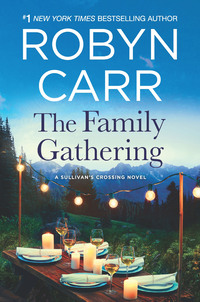
Полная версия
The Promise
When she’d moved in, Nicholas had been eight, Pamela had been ten, Krissy had been thirteen. She had asked herself so often how she had lasted over two years under the same roof with them. Her first year with Ted, she’d helped with the kids but hadn’t moved in. The third year, the last year, had been miserable because she was at the end of her rope with the kids and Ted. But that second year? There had been respites every week when Olivia took the kids and Peyton’s work life and home life was calm and serene. On those days she’d reexamined her love for Ted and believed without a doubt that if not for the kids and their lack of discipline and respect, she could be very happy with the man. He was strong and affectionate and generous. And he loved her so much—he said so all the time. It took almost a whole year for her to figure out that his schedule was much better when it was only Peyton and not his children cluttering up his life.
At first her parents had doubted the situation was as severe as she described it. “Oh, honey,” her mother had said, “it can’t be that bad. What are they but kids! They’re not very old. You have your boundaries, make sure they know your limits, reinforce. We had eight, and our household was sometimes loud and messy, but we managed just fine.”
Then she’d taken Ted and the kids to the farm. Pam hadn’t wanted to tour the farm or orchard, so she’d gone upstairs to the bedroom she was sharing with Krissy and closed herself in the room with her iPad. Krissy wasn’t about to eat the dinner she was served. Pam didn’t enjoy gathering eggs with Peyton so she threw them on the ground and laughed like a hyena at the splatter. Nicholas switched the channel on the TV, and when he was told it was Gramp’s choice now because he’d put in a long day, he pitched a fit. When told there weren’t televisions in every bedroom, he threw himself on the floor and screamed until he was blue, and Ted had had to carry him outside. Krissy kicked the dog, Pam threw a cat out of her way. Nicholas deliberately tipped his milk over on the table because he didn’t like milk with meals—he wanted Coke. There was no Coke at the farm. No Coke, no TVs, no private bathrooms, no entertainment and Ted felt trapped. Ted, who didn’t own a pair of blue jeans. He lowered his voice to say to Peyton, “We’ll have to leave early. My kids are not farm kids.”
“I don’t think this is going to work with your man, Peyton,” her mother had said later.
“Because of his kids?” she’d stupidly asked.
“No, darling little Babette. Because of his disability. The poor man appears to be blind and deaf. That’s going to present problems.”
So for almost three years they’d fought a lot, made love on days off from the monsters, fought some more, and the weeks—so busy Peyton could barely think—ran together until she’d realized she’d been with him for almost three years, was almost thirty-five, and nothing had improved. In fact, it had been getting worse by the day.
Then she’d found pot in Krissy’s backpack. The bag was sitting on a kitchen chair, the zipper open, the drugs clearly visible. Peyton went ballistic; she confiscated it and called Ted home from work. The fireworks were nuclear. Krissy accused Peyton of searching her personal property, insisted she was holding it for a friend she wouldn’t name. Ted was furious to be called away from his practice for a “minor” problem like that. “Come on, Peyton, like you didn’t come into contact with a little weed when you were a teenager!”
Oh. My. God! Peyton knew her father would have killed her! But Ted wouldn’t even agree to ground Krissy. “You’re going to be sorry,” she had told him. “That girl is on a bad journey, and it’s going to get worse. She’s not even remorseful. She blames me!”
Peyton had lasted about two more months.
No wonder she was determined not to work for a single father again. She knew not all kids were terrible, but she was not up to working her ass off as a PA and taking on parenting duties after work. Scott Grant, devoted family man, was obviously happily married and wouldn’t be imposing in that way.
A couple, holding hands, came cautiously down the stairs from Cooper’s house to the beach. Wedding guests. The woman was a pretty blonde, carrying her heeled slippers, and he was a tall man with dark red hair and kept his arm around her waist. They walked about twenty feet and stopped. He lifted her chin and kissed her deeply.
That was hard to see, Peyton thought. Fresh from her breakup, it wasn’t easy. She wanted to be loved; she was willing to give a lot to a relationship. She had tried so hard.
* * *
On Sunday, before she was completely settled in Thunder Point, Peyton called a friend from Ted’s office—their triage nurse, Amy. She hadn’t talked to her since her abrupt departure three weeks before, and Amy had been her closest work friend.
“I’m taking a position in a very small clinic in a very small town. It will give me time to think about my next job. I made a three month commitment, and during the next three months, I’ll put out some feelers, try to decide where I want to be. It isn’t going to be in Portland, Amy. I don’t want to run into Ted and his new assistant.”
“You should know—they came out. They’re a couple. It’s all huggy-huggy, kissy-touchy. They’re officially dating.”
Peyton sighed. “It’s like they couldn’t wait for me to leave.”
“You were gone an hour,” Amy said, disgust in her voice.
“He’s twenty years older than she is.”
“He needs a babysitter,” Amy said. “In the end he might need a sitter for her. My advice? Don’t look back.”
Peyton texted Ted and told him she had not yet seen the severance check and gave him the address for Scott’s clinic and asked him to send it there. Posthaste. She didn’t need it, but by damn, she was going to push for it. No one had given Ted more than she had. Fortunately, she had saved enough of her income over the past several years to emerge debt free and with a healthy savings account. She could get on with her life.
Alone.
* * *
Monday morning at around ten, Peyton dropped by the clinic. She hadn’t given Scott a starting date, but she had nothing to do to settle into her little space, so she might as well see if he needed her. She had noticed Devon wore scrubs and tennis shoes, perfectly appropriate for clinic personnel. But Scott had been wearing jeans, so she opted for nice jeans and a starched blouse. While it was definitely sandal weather, she wore closed-toed shoes with a heel. She’d soon find out if scrubs were more practical.
“I wasn’t expecting you until next week,” he said.
“I know, but Devon called and said she’d be away and if I could spare the time...”
“I can manage if you have things to do, Peyton,” he said.
She really didn’t want him to know how pathetic her life looked, that she had almost nothing to move into her little duplex. “I’m fine. There’s not much to do to get acclimated, and I wanted to give you at least a few hours today in case you got busy.”
“If you’re sure, we’ll think of it as orientation. It won’t take any time at all before you know where everything is. Over the weekend I made room for you in my office. You can use my desk whenever I’m not using it, but I added a small, portable but very sturdy folding table and desk chair and brought a laptop from home in case—”
“I have my own laptop,” she said. “Do you have wireless so I can get online? Ten years ago I carted around boxes of books but now...”
“I know. We’ve come a long way, haven’t we? I subscribe to a medical link service. I’ll give you the password. Everything from a Physician’s Desk Reference to very classy pictures of rashes and warts.”
She laughed in spite of herself. “See a lot of those, do you?”
“It’s not that there are a lot. I have trouble telling them all apart! There’s a white lab coat in the back if you want to save your blouse from...from the many vagaries of our profession.”
Orientation was comprised of more than learning Scott’s system, where the supplies were kept and figuring out the appointment calendar. It was also meeting the people. In a small-town clinic, she learned, you served the neighborhood. There was Mrs. Rodriquez’s diabetes, Lynn Bishop’s prenatal visits, Bob Flannigan’s arthritis, Crawford Downy Sr.’s high blood pressure and elevated cholesterol, and his wife’s onset of acid reflux. There was Mrs. Bledsoe’s Parkinson’s—beautifully controlled at the moment, Tara Redding’s asthma, Frank Samson’s chronic back spasms, a strained and perhaps torn rotator cuff from one of the fishermen down at the marina, a few referrals and a couple of blood draws. The clinic was busy all day, and whether Scott would admit it or not, Peyton knew he would have had trouble keeping up without her. For the two of them, it wasn’t overwhelming, but there was no downtime. She administered some antibiotic, put in a few stitches, applied an ice pack and caught up on some charting. She thought she was home free until the nine-month-old with a fever she had balanced on her hip threw up on her.
“Feel better?” she asked the infant.
The baby flashed a wide, adorable, toothless smile, causing Scott to laugh so hard, he bent over.
“I keep a couple of spare shirts in my closet,” Scott said, still laughing. “I’ll get you one.”
Peyton finished the day in Scott’s shirt, but it had been such a good day that she didn’t mind a bit. With hardly any training at all, they had worked together exceptionally well. “I guess I’ll either wear the lab coat or add a couple of my own shirts to the closet,” she said.
“Choice of clothing is entirely up to you. Devon likes the scrubs for comfort, and it keeps her costs down. Some days I just throw on scrubs, but those are usually the days I’m scheduled at one of the hospitals. I don’t have many patients to see on rounds, but if I can give them a few hours in their clinic or ER, it helps.”
“They let you have a schedule that gives them just a few hours?”
“It’s all I have,” he said. “Plus, I’m pretty cheap.” And then he grinned.
She was caught on that smile, momentarily mesmerized. There was no veneer, no cover. He was completely accessible, maybe a little vulnerable. On that very first day she understood. He’s not about money or image; he’s all about being a good health care provider. That’s all it took—one day and that engaging smile and she knew, Scott was the real deal. A good man. Good to the bone. He was welcoming. Warm and giving and talented. And that was why the clinic was working. His patients clearly loved and trusted him. They depended on him thoroughly; they dropped in whether ill or well, just to update him on the latest news, and not just about their health.
Realizing this was almost a blow, given where she came from. Ted was the kind of man who could knock you off your feet, reel you in, get you to do anything he asked. Ted had articles written about him; he contributed on television medical news stories. Scott wanted to take care of his people. He was more embracing, anxious to give you something you needed. Ted was a Lamborghini; Scott was a Jeep. Ted was all flash, while Scott was unpretentious and solid. There was no hidden agenda here. And while she might’ve started the day thinking it was a three-month gig to give her a chance to live simply and get her head together, she quickly saw it as a good idea, an opportunity to learn about small-town medicine from a master. And the other shock was she found the Jeep far sexier than the Lamborghini.
Her second day in the clinic was much the same as the first, busy all day, and she already felt at home.
“It might go a little easier on me if you weren’t so damn efficient and personable,” Scott said. “If you were klutzy, lazy and annoying, I wouldn’t mind giving you up in three months.”
She laughed at him and said, “There’s another reason I can’t stay longer,” she said. “It’s not just the money, although you have to admit...”
“I’ll be the first to admit it’s not nearly what you deserve,” he said. “It’s just what the clinic can bear. So, what else is going on?”
“My youngest sister is having her first baby, and I promised to be with her. She’s the sister I’m closest to and she’s in San Francisco.”
“Auntie Peyton,” he said with that warm, loving smile. “Well, if that’s all it is, we can always work out time off. Family comes first.”
Don’t be too nice to me, don’t make me want to be here. I really can’t afford to trust a man again too soon, she thought.
And then, at three in the afternoon of that second day, there was a red flag. It was almost as if it was delivered on request. Gina’s daughter, Ashley, brought Scott’s children to the clinic. “Scott, I checked with everyone, even my mom, to see if anyone could babysit for a couple of hours, and I’m sorry, there’s no one. We’re covered for tomorrow till five, but now I have to go to work at the diner.”
“Don’t worry, Ashley. Not a problem. They can watch their movies or color in the break room for a couple of hours,” Scott said.
“Are you sure? There’s always Cooper or Rawley—I didn’t try them because they have Devon and Spencer’s kids.”
“They probably have their hands full. This is okay.” He bent down to kiss them each on their foreheads.
Ashley handed over a couple of backpacks, one pink and girlie, one camouflage and oh, so manly. “You’re loaded up with books, Kindles with their movies, crayons, special cups, bags of fruit chewies....”
“Thanks, Ash. You’ve been a big help. Ashley, this is Peyton, our new physician’s assistant. Peyton, meet Gina’s daughter, Ashley James.”
Peyton put out her hand. “Nice to meet you.”
“I heard about you. My mom mentioned meeting you. Welcome. I hope you’ll like it here.”
“I already like it here,” Peyton said.
“I’m off to the diner. My mom has to get out of there on time—the younger kids have lessons and stuff, and Mac is on duty until dinnertime.”
As Ashley headed out the door, Scott introduced the kids. “This is Jenny, and this is Will, four and five years old. Will starts kindergarten in the fall.”
Peyton crouched. “How do you do,” she said, smiling. They were simply beautiful children, Jenny with her long, curling brown hair and Will trying to act so grown up, one strap of his backpack slung over his shoulder. “Where’s Mommy today? Working?”
“Mommy lives in heaven,” Jenny said.
Peyton almost fell flat on her ass. She had to put a hand down to steady herself enough to rise to her full height. She was stricken. She looked at Scott, shaking her head. “I’m so sorry,” she said softly.
He held up a hand. “Not a problem, Peyton. Let me get the kids settled in the break room, and I’ll explain.”
She actually had to sit down. Her knees wobbled slightly.
He was back in no time. “Well, I don’t know how you made it a whole week in Thunder Point without knowing that, but to be honest, I’m relieved. I guess that means they don’t all talk about me as the lonely widower as often as I thought they did.”
She shook her head, but couldn’t seem to close her mouth. She cleared her throat. “A devoted family man,” she said weakly. “With a mother-in-law?”
“I am devoted, and my wife might be deceased, but my mother-in-law is going to be dancing on my grave,” he said. “I lost Serena immediately following Jenny’s birth. She was on life support for a while. She wouldn’t have liked that, but Serena was an organ donor and...well, I’m glad now. She wasn’t in pain, and I really didn’t want Jenny to grow up associating her birthday with her mother’s death. I was widowed four years ago. I have a nanny. Au pair. Babysitter. Right arm. Gabriella is twenty now and has been with me here in Thunder Point the past year. She’s been managing the house and kids with my assistance and going to school, but her mother was diagnosed with breast cancer. She’s going to be fine, but Gabriella wanted to be with her and left kind of suddenly. I think she just got scared. Understandable. Usually Devon and I, both single parents, could help each other out when things came up, but I’d shut the clinic before I’d call her on her honeymoon....”
“Devon is no longer a single parent,” Peyton said.
“I doubt that will change anything. Mercy and Austin are as comfortable at my house as they are at home.” He laughed. “Austin has two families as it is—talk about a flexible kid.”
“But what if you’re called to the hospital?” Peyton asked.
“I’m not on call. I had to cancel when Gabriella left.”
“Does this sort of thing happen a lot?” she asked, tilting her head toward the break room. “Kids in the office?”
“Only once in the past year. They’re very well behaved, but I don’t want them here as a habit. For obvious reasons...”
“Sick people, being one?”
“And the sheer distraction, not to mention a million questions.”
There was a sudden loud whoop-whoop-whoop from outside, and Peyton whirled to see Mac in the sheriff’s deputy’s SUV roar down the street with lights and sirens. And right behind him another deputy followed, also lit up. Behind them, the wrecker from the service station was moving pretty fast, lights revolving.
“Wow,” she said.
“That doesn’t look good. I’ve only seen Mac all lit up once since I moved here. I’ve never seen Mac and the other deputy both tear out of town like that.”
Right then his cell phone rang, and Peyton had a sinking feeling. It matched the look on Scott’s face. He pulled out his phone.
“Scott Grant,” he said; then he listened. He nodded to the phone. “Hold on,” he said. He looked at Peyton. “The perfect storm,” he said to her. “Bus accident just off 101 near Bandon. Church camp bus—full of kids. All area medical and rescue has been called.”
She didn’t even have to think about it. “Go.”
“On my way,” he said into the phone. He pocketed it. “The clinic keys and keys to my house are in the top desk drawer. You can close the clinic. Put up a sign—closed for emergency. You can take the kids to my house—plenty of food and toys.”
“I don’t know where you live!”
“Well, everyone else does. Just ask someone.”
“I don’t have safety seats!”
“It’s three blocks, Peyton. We walk from my house to the beach all the time.” Then he dashed into the break room to tell his children goodbye. She heard him say, “When I get home, I want Peyton to tell me you’re the best children in the world.”
“Oh, God,” she whispered to herself. “This isn’t happening to me.”
Four
There were a few patients scheduled, and Peyton thought she might be just turning them away with the excuse that the doctor had an emergency, and since she was new, she didn’t want to presume to take over their treatment. But six people stopped by and didn’t expect to keep their appointments—they only wondered what she had heard about the accident. One of them was Carrie from the deli next door, and she was kind enough to give Peyton directions to Scott’s house.
She sat at the table in the break room for a little while, making sure the kids were comfortable with her before taking them home. “Well, I suppose we should lock up the clinic and head to your house. Want to show me the way?” she asked.
“Follow me,” Will said, backpack slung over one shoulder.
She shoved her directions into her pocket and, holding Jenny’s hand, followed. Will went up the walk to a small house with a nice little flower bed in the front. He waited by the door until she could unlock it for them. Then, inside they went, dropping backpacks in the foyer.
“First, we have a snack,” Will said.
“What kind of a snack?” Peyton asked.
Jenny went to the pantry and got out some Goldfish crackers. “We have our own dish,” she instructed. “Then we play. Then we have dinner. Then we have a bath. Then ice cream.”
“Wow, that sounds like a very busy schedule. And sounds like you’re almost ready to take care of yourselves. Want to show me the dish you want for the fishies?”
Jenny was happy to do that. She pulled the step stool over to the counter, climbed up and opened a cupboard that revealed some bright-colored plastic plates and bowls.
“Do you have kids?” Jenny asked.
“Nope. But I come from a very big family, and I have lots of brothers, sisters, nieces and nephews. Lots,” Peyton replied.
“Like five?”
Peyton laughed. “More like twenty-five.”
Jenny looked quite impressed.
The very first thing to put Peyton a little more at ease was Scott’s house. It was quite nice but very ordinary and on the small side. She looked around a little bit. There was nothing uppity or fancy here. There was a kitchen with nook, small dining room, living room, master with bath, second bath and two more bedrooms. Right away she was pretty sure Scott would never say the words, I have an image to maintain, Peyton.
“Where does the babysitter stay?” she asked Jenny.
“Gabby has the whole downstairs!” Jenny said.
“We’re not allowed down there—it’s hers!” Will said. “She has her own TV!”
“I suppose she should,” Peyton said. “She probably has things to watch that you wouldn’t like that much.”
“And she has a boyfriend! Charles. They kiss!” Jenny said.
Peyton laughed. “You might have a boyfriend someday, you know.”
“No, I don’t like boys. Except Daddy and Will. Sometimes Will.”
“And what does Daddy say about that? As if I don’t know.”
“He says, good.”
Will lost interest in the conversation when it veered into boys and kissing. He went to his backpack for his Kindle and held it up while he snacked, watching some downloaded movie or cartoon. During this time, Jenny informed Peyton that they could have pizza for dinner because that’s what they did when there was no cooking. Gabby had to visit her mother, so Daddy was cooking, but not too much. Peyton was shown where to find the frozen pizzas and ice cream. Peyton was fully capable of that but wondered if Scott might be home before then. While Jenny was conducting her kitchen tour, Will left the room. He returned quickly, his arms laden with blankets, some dragging along the floor.
“Excuse me, sir,” Peyton said. “What’s going on there?”
“It’s for a fort.”
“Where?”
“There,” he said, indicating the dining room table.
“Where did you get the blankets?” she asked.
“From the closet floor. They’re fort blankets, not bed blankets. They’re too dirty for the bed, Gabby said.”
“I see. So I guess Daddy allows this?”
“Sometimes he gets in it with us, if he doesn’t have a book or a phone call,” Will explained.
Peyton stepped closer to the dining room to watch the construction of the fort, which was accomplished with all the precision of experienced builders. Heavy books held the blankets on top of the table, chairs were turned around to make more space underneath, one blanket on the floor, a couple of pillows inside.
“And what do you do in there?” she asked.
Will shrugged and just pressed on. “Take stuff in there.”
“Sometimes we have ice cream in there,” Jenny added. “Or movies. And games and books and stuff. But not paints or clay or Play-Doh.”
“I can see how that would be a problem,” Peyton said. “I’ll be in the living room.”
The kids disappeared inside, and she was very grateful for that. She wanted to turn on the TV, see if there was any coverage of this wreck. It wouldn’t be good to turn on the news and have the kids hear anything shocking or scary since their father was there. But she wanted to know any available details. She was not optimistic there would be much news as this was a very small town, and it was an accident off the main roads.
But, ah! In the age of smartphones there was amateur footage already sent to news stations. And it looked god-awful. A blue school bus was on its side halfway off the road, back emergency door gaping open and lots of emergency vehicles all around. There were other vehicles scattered around, but she couldn’t tell if they’d been involved. A Coast Guard helicopter was taking off, presumably airlifting a patient or patients—USCG provided emergency services to the local area. The scene looked chaotic and terrifying, but the broadcaster said that even though there were thirty-seven children on board and many injuries, there was only one fatality, the bus driver.










